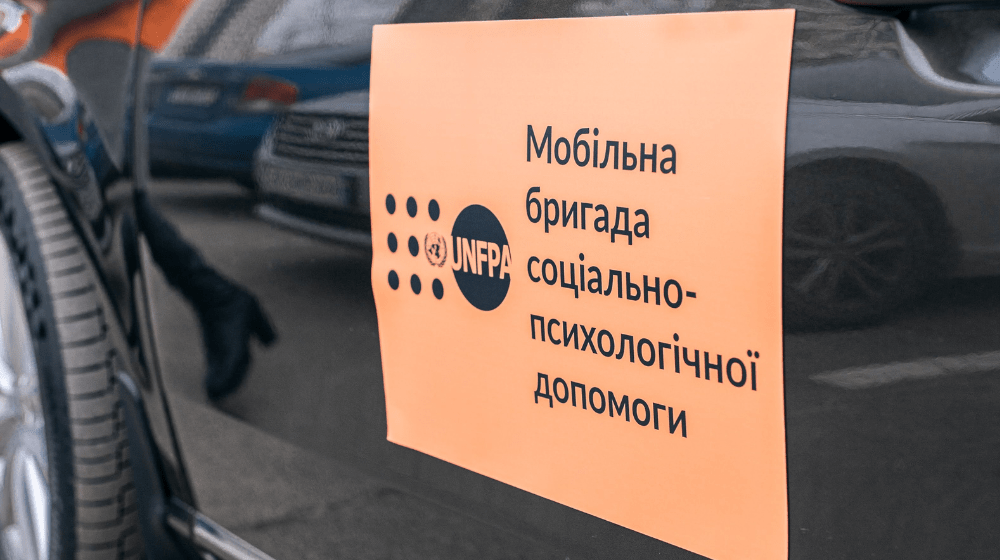In Korosten, less than 150 kilometers from the Belarusian border, the beginning of Russia's full-scale war against Ukraine was felt from the first hours. Despite the rapid advance of Russian troops into Ukraine, Alina Pashynska, a resident of the city and a social worker with 17 years of experience in the field, was determined to stay in Korosten.
"We were under fire, we saw tanks and heard everything. It was really scary. When you see these real events in front of you, you realize that this is not a dream and you are not imagining things. This is war," the woman recalls the events of that time.
Having overcome the panic, she started volunteering — first weaving nets, and then doing what she does best — calming people down to stabilize their emotional state.
"I decided that I needed to look at things from a common sense perspective and make the appropriate decisions," says the professional with 17 years of experience in the social sector. "It was very scary, but I had no idea of leaving my home. What has to be will be, but in our motherland, our native Ukraine."
Since the end of July, Pashynska, as a social educator, has joined the work of a psychosocial support mobile team for survivors of gender-based violence, launched with the support of UNFPA, the United Nations Population Fund.
According to her, as soon as the opportunity arose, she accepted without hesitation, because "she has devoted her entire life to the social area." Pashynska's experience in previous years has allowed her not only to help families who come to her, but also to identify cases of violence among those in "difficult life circumstances."
Depression is an important marker in identifying violence
"Every month we have mostly three or four emergency cases, when people come to us on their own. The rest of the time we deal with scheduled cases. Maybe it's even easier for me because I've worked before and I know these people who find themselves in difficult life circumstances," explains the specialist and adds that when dealing with survivors, their depression is an important marker that violence is happening.
In addition to social and psychological support, the team's specialists provide full support to the survivors. "If legal, medical, or law enforcement assistance is needed, we refer them to the appropriate services," Pashynska says. They also draw up a security plan with clients, assess their needs and sign a non-disclosure agreement, she adds.
With the influx of internally displaced persons (IDPs) into the city from regions where active hostilities are ongoing, the mobile team also has more work, as it is often difficult for people to find a common language, she continues. However, according to Pashynska, this problem has been mostly solved: some people have been found housing, others have been placed in accommodation centers.
Prevalence of violence as a consequence of war
According to the woman, misunderstandings among IDPs are not unusual, as the war often deteriorates the atmosphere even in families that were friendly. "You can feel the disturbance of people's emotional state more. People react more nervously. The war is traumatizing, and there will be more survivors in the future," the expert notes.
Although the team's services are available to both women and men, it is mostly women who seek the team's help. However, survivors are often left alone with their problem, Pashynska says. One of the reasons for this, she says, is the fear of being judged by others.
"People think: what will they say about me? This is my husband or my wife. It is only when a third party intervenes, for example, a specialist from a mobile team, that people open up after a long time of work," the expert notes. She urges anyone who witnesses violence to report it.
Timely intervention saves families
Often, timely intervention and assistance help to preserve the family.
According to her, it even happened that a couple who had been separated for a long time got back together. At the same time, there are cases where divorce is the only healthy option.
"When there is physical violence and constant threats, you should leave and not come back," she advises.
According to her, violence is often committed while drunk. The team does not work directly with the offenders, but redirects them to the city's center for social and psychological rehabilitation, Pashynska said.
"There are those who do not drink alcohol after treatment. I consider this to be a positive result as well - everything is fine in the family and he is doing well," adds the specialist.
The result of the work is "inspiring"
Amid the stressful nature of the work and the constant tension due to the city's proximity to Belarus, it can be difficult for specialists to cope psychologically with background anxiety. However, Pashynska says she is inspired by the positive solutions to her clients' situations.
"When you see the result you're involved in, it's like wings grow. Sometimes people come with their children and thank us. There was a case when we transported a survivor to a safe place. She thanked us for a long time afterward. I still remember the warmth of her hands," the woman says.
Pashynska advises all people who find themselves in a situation of violence to respect themselves and not to keep silent about the problem.
"If you remain silent, it will never end. There is a way out. There are specialists who will always listen. And most importantly, our work is confidential. Everything remains between us. And afterwards, it will be much easier," the specialist assures.
UNFPA's psychosocial support mobile team in Korosten operates thanks to the funding by the UK government.
To get help from the mobile team, please call the following numbers:
+380505331078
+380961415186
You can find contacts of the mobile teams on the UNFPA website.


